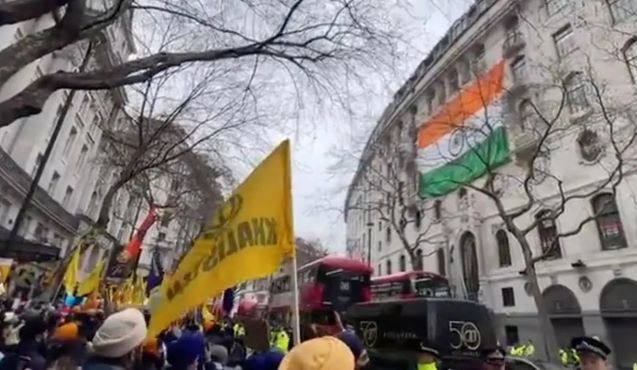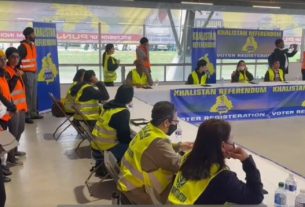A government appointed review commission in United Kingdom observes that Sikh extremism is on the rise in UK and pose a significant challenge to the country’s social cohesion.
The comprehensive review report titled “Does government ‘Do God?’” examines on how government should engage with faith groups in UK.” This report has been authored by Mr. Colin Bloom, UK Government’s Faith Engagement Advisor. It was commissioned by the Boris Johnson government in October 2019. The report is based on 21,000 public responses and interviews with experts, politicians, academicians and officials.
In the chapter pertaining to faith-based extremism, the report deals extensively with Sikh separatist movement seeking to establish an independent Sikh state called Khalistan in the Punjab region of India. The report observes that movement grew in power and influence in the 1980s and 1990s and has since been associated with acts of violence and extremism. While the movement reflects a tiny minority of British Sikhs, they attract disproportionate amounts of attention and stoke divisive sentiments in sectors of Sikh communities.
The report also highlights the subversive tactics and methods some Sikh activists employ to divert public attention away from their subversive agenda, such as using various aliases to subvert the British political order. Canada is also experiencing a similar phenomenon, with some Sikh activists attempting to disrupt and jeopardize Canadian and Indian political orders. The report suggests that it is vital for the government to develop a more comprehensive understanding of the tactics and methods some Sikh activists employ to divert public attention away from their subversive agenda.
The report further discusses the controversy over calls for an additional tick box option in the 2021 Census, which would allow individuals to identify as ethnically Sikh instead of, or as well as, religiously Sikh. While attempts to change the Census have come from members of Sikh communities, they are not reflective of the broader community. The Office for National Statistics concluded that including ‘Sikh’ under ‘Other ethnic groups’ prompted concerns and suspicions about why Sikh was being separated from the Asian or Indian tick boxes, as the majority of those answering ‘Sikh’ to the religion question in the 2011 Census and the 2017 ethnic group question ticked the ‘Indian’ ethnic group box.
The report then delves upon the issue of sectarian or discriminatory behaviour within the British Sikh communities, highlighting the impact on community cohesion. Some groups in the community promote sectarian, discriminatory, or even misogynistic ideas such as anti-Muslim hatred, anti-British hatred, and Sikh-only marriages. Such activities disrupt and undermine the cohesiveness of the community. These groups use fear tactics and intimidation to dissuade interfaith marriages, which has resulted in an “infinitely small number of public interfaith marriages in gurdwaras in England.”
Some members of the Sikh community are focusing solely on the reported grievance of Muslim men grooming or sexually exploiting Sikh women to the exclusion of other types of intra-community abuse, which is worrying. Moreover, some individuals connected to certain Sikh groups have had historical associations with white nationalist groups, including the English Defence League and the British National Party, despite protestations to the contrary. These groups are likely to have centered around a common anti-Muslim agenda, including on tackling alleged Muslim grooming gangs.
The report highlights that Sikh extremists and their supporters often upload videos and other materials onto social media platforms containing offensive imagery, language, and the glorification of extremist behaviour. There are videos that incite violence and hatred towards Muslims, Hindus, and even other Sikhs who disagree with the minority extremist ideology. Khalsa Television Ltd, which served Sikh communities in the UK, was fined £50,000 by Ofcom in February 2021 for failing to comply with broadcasting rules. The channel aired a music video indirectly calling for violence (including murder) and a discussion programme which provided a platform for views that amounted to indirect calls to action that were likely to encourage or incite crime or lead to disorder.
The report asserts that extremist videos uploaded to the internet should be dealt with in a similar way to content that incites violence on television stations, and should be tackled using the Online Safety Bill. The impact assessment of the Online Safety Bill specifically recognises the risk of extremist content as part of the rationale for intervention, ensuring online platforms are held accountable for violent, harmful, and abusive content.
Overall, the report highlights the complexities and nuances of the Khalistan movement and the rising tensions within Sikh communities. It emphasizes that these subversive, sectarian, and discriminatory activities do not reflect the true nature of the majority of British Sikh communities, who are the ones ultimately adversely affected by this nefarious behaviour of extremist elements within the community. It is essential for the UK Government to demonstrate that such extremist views and behaviour are not tolerated in UK.





